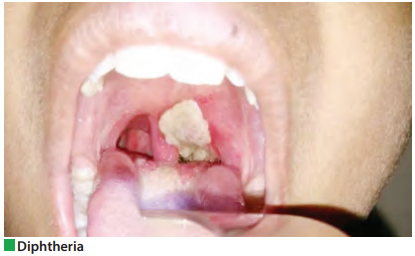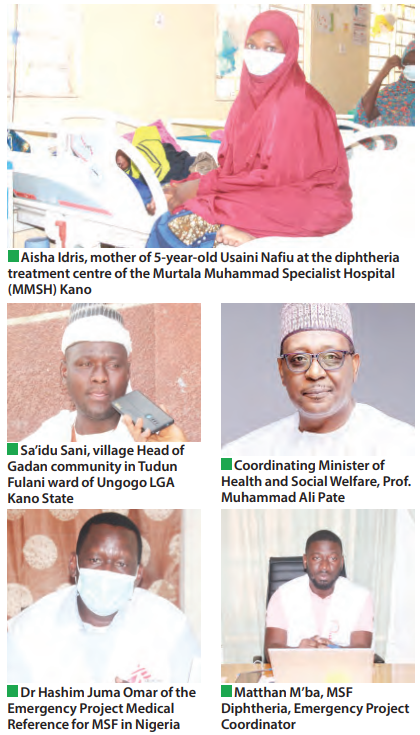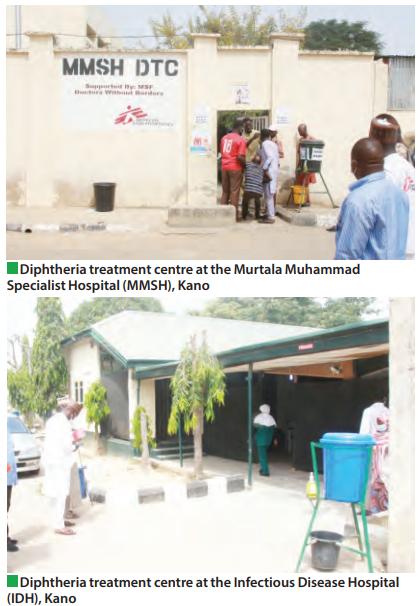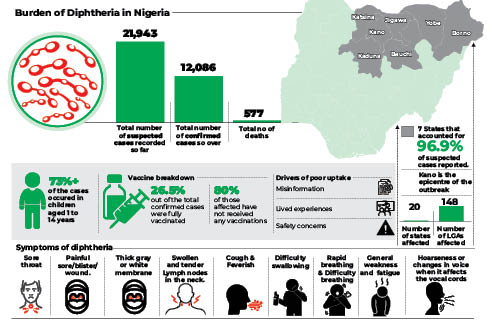Nigeria is currently experiencing a diphtheria outbreak. UNICEF describes it as the most severe diphtheria outbreak in recent global history. Despite the fact that diphtheria is a vaccine-preventable disease, the disease has continued to claim lives and spread to more states of the country. This report x-rayed the drivers of poor uptake of diphtheria vaccines in Nigeria, ways to tackle them, as well as the implications of the outbreak on global health.
Sunusi Shu’aibu, 2, is one of the children admitted at the diphtheria treatment centre of the Infectious Disease Hospital (IDH) in Kano, the epicentre of the current diphtheria outbreak in Nigeria.
His mother, Rahane Shu’aibu from Dawakin Tofa Local Government Area of the state, said Sunusi was not vaccinated against diphtheria and other diseases in the routine immunisation schedule.
“Everyone in my husband’s large family does not believe in vaccinating children against diseases. It is a practice I met when I got married into the family, and so, none of my four children and those of other family members have received any vaccine,” she said.
- Bingham varsity inaugurates N2.6bn projects
- ICPC will arrest more corrupt Nigerians using digitisation — NITDA
Shu’aibu, who said she gave birth to her son at home, added that there is a health centre in her community where some mothers take their children for vaccination, but that the men of her family who make decisions, as well as their wives have negative perceptions about the safety of vaccines for children.
She said that before her son fell ill, two children in the family had died of diphtheria.

Diphtheria is a highly contagious disease caused mainly by a bacteria called corynebacterium diphtheria, which can be fatal in 5-10 per cent of cases, with a higher mortality rate in young children.
The National Primary Health Care Development Agency (NPHCDA) says the bacteria usually spreads from person to person through respiratory droplets, often during coughing or sneezing.
“It can also be transmitted by touching contaminated objects,” Dr Ahmed Rufai Garba, the acting Director, Disease Control and Immunisation, NPHCDA, said. He said the symptoms could range from mild to severe and typically include a sore throat, fever and difficulty in breathing, adding that the characteristic feature is the formation of a thick grayish membrane in the throat and nasal passages, which can obstruct the airway.
Diphtheria vaccines
Diphtheria is preventable through vaccination, and is covered by one of the vaccines provided routinely through Nigeria’s childhood immunisation schedule.
Dr Garba said that in Nigeria, the primary vaccines targeting diphtheria are the Pentavalent vaccine and the Tetanus diphtheria (Td) vaccine.
Pentavalent vaccine
The NPHCDA immunisation director explained that within Nigeria’s immunisation schedule, the Pentavalent vaccine is highlighted as a key component. “This vaccine contains a combination of five different antigens, including the crucial one against diphtheria. It is administered in three series at specific intervals – 6, 10 and 14 weeks – primarily targeting children,” he said.
Tetanus diphtheria (Td) vaccine
He said the Tetanus diphtheria (Td) vaccine, distinct from the Pentavalent vaccine, served a dual purpose. It plays a crucial role in preventing the transmission of tetanus from mother to babies, and is also utilised in the immunisation schedule to address outbreaks of diphtheria in children aged four years and above.
Dr Garba said diphtheria vaccines were available in all government health facilities and some private health facilities in the country, adding that they are provided free, safe, and effective to the beneficiaries.
“Mothers are advised to ensure their children complete childhood vaccination series within the first year of life and receive vaccines throughout their life course as advised by medical professionals,” he said.
Vaccination coverage
A significant number of children in Nigeria remain unvaccinated or partially vaccinated.
According to the 2021 Nigeria Multiple Indicator Cluster Survey and National Immunisation Coverage Survey, the third dose of Pentavalent vaccine (Penta3) coverage, which protects against five life threatening diseases, including diphtheria, was 57 per ent in 2021.
The World Health Organisation (WHO) said the low national coverage (57%) of Penta 3 administered in routine immunisation, and the sub-optimal vaccination coverage in the pediatric population – with 43 per cent of the target population unvaccinated—underscores the risk of further spread and the accumulation of a critical mass of susceptible population in the country with sub-optimal herd or population immunity. Vaccine coverage of 80 to 85 per cent must be maintained to ensure community protection.
“This emphasises the urgent need to strengthen diphtheria vaccination coverage nationwide, especially in the most affected states, such as Kano.
“Additionally, particular attention is necessary for regions experiencing insecurity challenges like the North West, as it hampers vaccine accessibility. Due to insecurity, especially in North East, Nigeria, vaccination coverage remains suboptimal,” the WHO stated in a situation report.
Médecins Sans Frontières (MSF), an international organisation which has been providing support for the response to the diphtheria outbreak in Kano and other states in Nigeria, said about 70 per cent of the patients admitted in MSF facilities were not fully vaccinated or vaccinated at all, showing the alarmingly low vaccination coverage.
“In the North West, full vaccination coverage is of high concern, ranging from 6 per cent in Sokoto to 10 per cent in Zamfara and 18 per cent in Katsina, against a national average of 36 per cent. In the North East, the coverage is seemingly alarming, as only 15 per cent of the patients treated for diphtheria in our MSF facility in Gwange Paediatric Hospital in Maiduguri were fully vaccinated,” MSF said.
Current diphtheria outbreak
The NPHCDA said the current diphtheria outbreak in Nigeria started in the second quarter of 2023 in Kano State and later spread to other states.
It stated that the states most hit by the current outbreak were Kano, Bauchi, Jigawa, Katsina, Yobe, Kaduna and Borno, adding that so far, a total of 21,943 suspected cases have been reported, with 577 deaths recorded as at December 20, 2023.
“It is worth noting that Nigeria has not seen cases in over 40 years, the main reason being the effect of the COVID-19 pandemic on our health system, with the cohort of the children mostly affected being children born just before the pandemic and within the pandemic.
“The lack of access to basic health care within that period resulted in a large cohort of children being unvaccinated, and the immunity gap created provided the window for the outbreak,” Dr Garba, the acting Director, Disease Control and Immunisation of the agency said.
Data from the latest diphtheria situation report of the NCDC showed that Nigeria has so far recorded 12, 086 confirmed cases (58.4%) across 148 local government areas in 20 states.
The report also showed that Kano State has the highest number of cases and deaths from the ongoing diphtheria outbreak in Nigeria with 9,613, confirmed cases. The cases were reported from 39 local governments out of the 44 in the state.
In September, the director-general of the Kano State Primary Healthcare Management Board, Dr Muhammad Mahmud, said about 520 children were suspected to have lost their lives following the diphtheria outbreak in the state in 2023.
Matthan M’ba, MSF diphtheria, emergency project coordinator said the cases recorded in Kano during the outbreak were unprecedented. He said the MSF had been collaborating with the Kano State Ministry of Health to provide response for the outbreak, and that over the last few months, the curve of infection and mortality is gradually going down.
He said between January and June 2023, MSF diphtheria treatment facilities in Kano recorded 1,800 admissions for diphtheria, but that from June to November, it rose to over 9,000 admissions, adding that it may hit 12,000 admissions by the end of 2023.
Patients’ experiences
Naja’atu Muhammad is the mother of 9-year-old Suleiman Muhammad, who is a diphtheria patient at the same ward of the IDH – diphtheria treatment centre in Kano.
Muhammad said her son was not vaccinated against diphtheria and other vaccine-preventable childhood killer diseases because of the negative things she heard about vaccines.
She said, “At the time I gave birth to him, health workers in public hospitals in the state were on strike, but because I heard the vaccines caused harm to children, I didn’t bother to get him vaccinated elsewhere or when they called off the strike, till date.”
Hauwa’u Shehu Umar, the mother of a six-year-old Maryam Nura, who was also on admission for diphtheria at the same hospital, said doctors told her that Maryam had a mild form of diphtheria.
“Honestly, people discouraged us a lot not to take her for vaccination when I gave birth to her. They said it had side effects. But I later took her for some of the vaccines,” she said.
While Maryam has a mild form of the disease, many children with severe cases were also admitted in different wards, and at the Intensive Care Unit (ICU) of the IDH, and the Murtala Muhammad Specialist Hospital (MMSH), Kano, which are both MSF-supported diphtheria treatment centres.
During a visit to the MMSH, Aisha Idris, mother of five-year-old Usaini Nafiu from Bachirawa community of Ungogo Local Government Area, said Usaini did not receive the Pentavalent vaccine that would have protected him against diphtheria.
She said, “People were saying that the vaccine made children sick and that some of them died after receiving the vaccines. So, after I took him for Bacille Calmette-Guérin (BCG) vaccine, I didn’t take him for the other recommended ones.”
Diphtheria outbreak in Ungogo
Ungogo Local Government Area recorded the highest number of diphtheria cases in Kano State.
A visit to communities there revealed that many children and adults were not vaccinated or partially vaccinated. But there was reduction in apathy for both the Pentavalent and Td diphtheria vaccines following the impact of the outbreak there, Daily Trust on Sunday learnt. There was also shortage of diphtheria vaccine for case management in response to the outbreak in some places.
Dandinshe, one of the communities in the local government area, is congested and popularly called ‘China’ because of the large population in the area.
Naziru Ja’afar, popularly known as Mai Taki, is a resident of Dandinshe whose 9-year-old twins, Hassana and Hussaina, were treated for diphtheria.
He said all members of his household were vaccinated after his children were diagonised of the disease, adding, “We are now very conscious of vaccination and encouraging others to take it.”
Bilkisu Idris, a health worker at the Dandinshe Primary Health Care Centre said ignorance contributed to the poor uptake of diphtheria vaccines before the current outbreak.
She said there was improvement in demand since the outbreak, but the vaccines were, however, not as readily available as they should be.
Abdullahi Muhammad, the ward head of Dandinshe, said the enormity of the diphtheria outbreak frightened his residents and they are now making themselves available for diphtheria and other vaccines.
He said that before then, many of them used to reject vaccines as a result of safety concerns.
Sa’idu Sani, the village head of Gadan communit, in Tudun Fulani ward of Ungogo Local Government Area, said his people had apathy towards diphtheria and other vaccines because they were suspicious.
He said, “The typical Hausa man, especially from Kano, does not believe that government would bring anything for free to your home. They suspect that there is a hidden agenda behind it.”
He said he participated in raising awareness and vaccinating children, noting that as a result, more people were getting vaccinated.
Reasons for poor uptake of diphtheria vaccines in Nigeria
An epidemiologist in Kano, Dr Shuaib Sani Shuaib, said the major challenges the country had been experiencing with vaccination were problems of coverage, especially in remote areas, lack of qualified and trained health care professionals to administer vaccines, and vaccine apathy.
He said some hospitals did not also have the required capacity to store diphtheria vaccines.
He explained that lots of people had mistaken the issue of vaccine apathy in Kano and some other places in sub-Sahara Africa to be due to ignorance. He, however, said it was actually as a result of ‘lived experience’ that has further led to people’s distrust in vaccines.
He said, “Lived experience in the sense that that people have received vaccines and ended up getting adverse effects from the vaccines. That is something that has happened in Kano.”
He explained that in 1996, Kano State experienced a meningitis epidemic, and Pfizer, a US-based pharmaceutical company, came to Kano and carried out a clinical drug trial on children without the requisite prior tests and approval from the US Food and Drug Administration (FDA).
“After the clinical trial, lots of children came down with adverse effects and the FDA and the European Medical Association withdrew the licence. The drug was eventually withdrawn from the market,” he said.
 The epidemiologist further said that as a result of the clinical trial, some of the children administered the drugs died while others lost the ability to walk, hear and had lots of other permanent disabilities.
The epidemiologist further said that as a result of the clinical trial, some of the children administered the drugs died while others lost the ability to walk, hear and had lots of other permanent disabilities.
He said that because of the incident, a lot of people in Kano have been having apathy and hesitancy towards vaccines.
Dr Shuaibu said there were also myths surrounding vaccines among the populace, adding that an example of a myth peddled about diphtheria vaccines is that people could bleed to death after receiving them.
He said other reasons for apathy towards diphtheria vaccines were poverty and over sensationalisation of adverse effects.
“If there are maybe one or two cases around them, people will over sensationalise it because of the myth they have heard. So it will be easy for such information to fly around because people are not getting the right information, and other people will act on the information,” he added.
Dr Hashim Juma Omar , the Emergency Project Medical Reference for MSF in Nigeria, said the low vaccination coverage mainly led to the diphtheria outbreak. He identified misinformation as one of the drivers of the hesitancy for diphtheria vaccines and other vaccines as well.
“One of them is the mis-information that the vaccines are geared towards family planning and reducing the population,” he said.
He said the MSF, in collaboration with the Kano State Ministry of Health, had put strategies such as health promotion and community engagement in place to raise awareness among the people.
He said that at the beginning of the outbreak some people were not willing to take diphtheria vaccines. But increased awareness in the communities led to improved acceptance of vaccination, including during the last mass diphtheria vaccination campaigns in September and October.
Dr Omar said the vaccine supply had not been regularly available to meet up with mass vaccination demand during the outbrea, in Kano, especially in most affected areas.
He said the government, MSF and other actors had been making efforts to address any shortages in between and make the vaccines available. He added that MSF had provided more than 7,200 IV macrolides, antibiotics, as well as 7,000 diphtheria antitoxin for case management.
Dogara Yohanna, a health promoter supervisor at the MSF, said some people he had interfaced with in the communities said they didn’t receive the vaccines because they heard they were not really for prevention of diseases but to cause infertility.
He said that during the recent mass vaccinations campaigns for diphtheria, people were circulating rumours on the social media, particularly on WhatsApp, that some children and adults that received diphtheria vaccines suffered from different health problems, including vomiting blood.
This, he said, stirred fear in the minds of some people and discouraged them from receiving the vaccines.
“But the commissioner for health came out to debunk the rumour and it helped. He said the diphtheria vaccine was safe and had nothing to do with the health problems they were circulating,” he added.
The UNICEF Nigeria Chief of Health, Eduardo Celades, said some of the children missed for vaccination during the COVID-19 pandemic were getting diphtheria and transmitting to others. He said the children were either not vaccinated at all or partially vaccinated.
The acting Director, Disease Control and Immunisation, NPHCDA, Dr Garba, said the poor uptake of diphtheria vaccines in Kano State and Nigeria in general was attributed to a combination of social, economic, logistical and health care system-related factors.
He said vaccine hesitancy, driven by skepticism about the safety and efficacy of vaccines, was identified as a critical factor.
“The mistrust surrounding vaccines significantly contributes to the low vaccination rates observed in Kano State and Nigeria as a whole,” he said.
He explained that the poor uptake of diphtheria vaccines is in part, a consequence of limited awareness within individuals and communities.
According to him, inadequate access to health care as a result of geographical and logistical challenges, particularly in rural or remote areas, and economic challenges, such as poverty and the associated costs of accessing health care services, contribute to the overall hesitancy among certain populations to receive vaccination.
The immunisation expert said cultural and religious influences were other reasons for poor uptake of vaccines, adding, “In northern Nigeria, cultural and religious beliefs influence health care decisions, including vaccine acceptance.”
He said other reasons were lack of education, in terms of general and health literacy, weaknesses in the health care system, and lack of multi-faceted approach or synergy among relevant stakeholders.
Ways to create demand for diphtheria vaccine, reduce outbreaks
Dr Omar of MSF Nigeria harped on the need for increased sensitisation and awareness about diphtheria vaccines and other types, saying the more people shy away from vaccination, the more the outbreaks and the more people get infected and die. He said the government, international donors and all stakeholders in the country should ensure increased access, availability and uptake of the three doses of diphtheria vaccine in babies at six, 10 and 14 weeks old. He added that making the vaccines available and encouraging people to access it would go a long way in tackling the disease.
Dr Shuaibu, the epidemiologist, said the way out was to create awareness, including on the adverse effects of vaccines. He said, “There is need for people to be sensitised that they may have chills and other adverse effects and what to do when they have them. It is also important to inform people that getting vaccinated against a disease does not mean that someone will never get the disease, but that they are very unlikely to get it, and that when they do, the severity will be reduced as a result of vaccination.”
While saying that there is the need to revamp the operational strategy for vaccines under the supervision of the relevant agencies, the epidemiologist said there w as also need for adequate diphtheria vaccines and adequate health facilities, including for remote settlements.
He called for synergy between international organisations and government at all levels to also address other root issues, such as malnutrition and sanitation that make children susceptible to diseases.
The UNICEF Nigeria Chief of Health, Eduardo Celades, called on the government and other stakeholders to ensure ‘a big catch up’, that is ensuring that children missed for vaccination during COVID-19 are vaccinated.
Also, Iyiola Oladunjoye, an Erasmus+ scholarship awardee of the Leading International Vaccinology Education programme said,“By reducing vaccine hesitancy through effective communication strategies, such as the use of infographics, dissemination of vaccination facts with local and indigenous languages in outlets, such as radio and television shows, we can help prevent future disease outbreaks caused by low immunisation rates.
“Furthermore, countering misinformation about vaccines must be prioritised by leveraging evidence-based research studies, as well as utilising trustworthy information channels, such as community health workers who can educate individuals regarding best practices for disease prevention via vaccination.”
What FG is doing to address poor uptake and create demand for diphtheria vaccines
Dr Garba of the NPHCDA said the country had long initiated response by the inauguration of a Ministerial Diphtheria Task Team co-chaired by the executive director of the NPHCDA and the director-general of the NCDC.
He said the team conducted outbreak response activities in all the states affected, noting, “This has resulted in the vaccination of 4,226,183 children with diphtheria containing vaccine Td (Tetanus Diphtheria) in children aged four years and above, while 2,233,256 vaccinations have been recorded in children less than four years with the Pentavalent vaccine.”
He said diphtheria cases were reducing, and the government, through the task team, had put in place a sensitive surveillance structure to detect and promptly conduct tests to confirm infection with the disease.
According to him, the current diphtheria outbreak underscores the fact that vaccines are effective in preventing diseases, as a large majority of the children of the children affected were either unvaccinated or partially vaccinated.
He said the Federal Ministry of Health and Social Welfare, in collaboration with the NPHCDA and various developmental partners, donors and stakeholders, had formulated a comprehensive advocacy communication and social mobilisation plan to bolster the demand for vaccines, not limited to diphtheria vaccines alone.
He explained that the multifaceted plan encompassed diverse strategies, such as extensive public education and sensitisation activities at the federal and sub-national levels, dispelling rumours, media engagement, grassroots sensitisation, school vaccination programmes, strengthening health care infrastructure, building capacity of health care workers, and collaborations between government with respected personalities and non-governmental partners to drive demand, particularly at the sub-national levels.
He said concerted effort was made to provide vaccines in urban and remote areas through outreaches and campaigns.
Implications of Nigeria’s diphtheria outbreak on global health
There are concerns about further spread of the outbreak beyond Nigeria’s borders, as well as implications for global health. Niger and some countries are also experiencing outbreaks of the disease.
The NPHCDA said diphtheria outbreak in Nigeria had implications for global health due to its contagious nature, and that countries with low vaccination rates were particularly vulnerable to the importation of infectious diseases.
Dr Garba said the current diphtheria outbreak emphasized the importance of strengthening immunisation programmes globally. He said, “The collaborative approach, involving various stakeholders and international cooperation is highlighted as essential to tackling the ongoing health crisis. The narrative underscores the urgency of the situation, portraying it as a global responsibility to protect the leaders of tomorrow by improving vaccination coverage and ensuring a comprehensive response to the diphtheria outbreak in Nigeria.”
The expert said the World Health Organisation recognised the importance of addressing outbreaks at their source to safeguard global health security, adding, Diphtheria outbreak in Nigeria, if not adequately contained, poses a risk of international transmission, especially to regions with low immunisation coverage. This highlights the need for collaborative efforts and information sharing among nations to mitigate the potential global impact.”
He said to mitigate the risk of international spread, it is imperative to improve surveillance at points of entry, which the country has activated, working with the Port Health division of the Federal Ministry of Health and the NCDC as a necessary step.
This report was supported by the Population Reference
Bureau’s (PRB) Public Health Reporting Corps (Nigeria and India) programme.

 Join Daily Trust WhatsApp Community For Quick Access To News and Happenings Around You.
Join Daily Trust WhatsApp Community For Quick Access To News and Happenings Around You.


